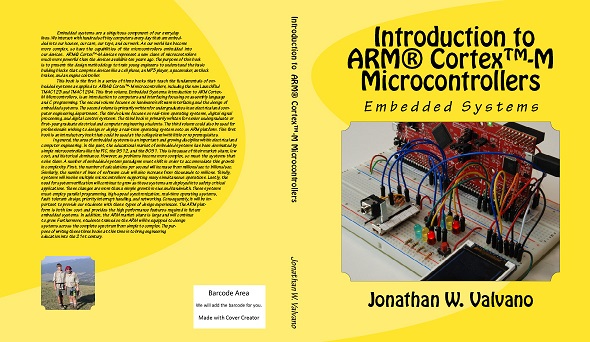
ISBN: 978-1477508992, also on CreateSpace

| 1. Introduction to Computers and Electronics |
| 2. Introduction to Embedded Systems |
| 3. Introduction to the ARM Cortex-M |
| 4. Introduction to Input/Output |
| 5. Modular Programming |
| 6. Pointers and Data Structures |
| 7. Variables, Numbers, and Parameter Passing |
| 8. Serial and Parallel Port Interfacing |
| 9. Interrupt Programming and Real-time Systems |
| 10. Analog I/O Interfacing |
| 11. Communication Systems |
| Appendix 1. Glossary |
| Appendix 2. Solutions to Checkpoints |
| Appendix 3. How to Convert Projects from Keil to CCS |
| Appendix 4. Assembly Reference |
| Index |
| Reference Material |
Dr. Jon Valvano is a professor in the Department of Electrical and Computer Engineering at The University of Texas at Austin and holds the Engineering Foundation Centennial Teaching Fellowship in Electrical Engineering. He received his S.B. and S.M. in Electrical and Computer Engineering from MIT in 1977 and his Ph.D. in 1981 from the joint Harvard-MIT program in Medical Engineering and Medical Physics. He joined the faculty at The University of Texas at Austin in 1981 and has 32 years of experience in teaching and research. He has received numerous teaching awards and authored five widely-used textbooks on embedded microcomputer systems. He has co-founded a successful medical device company called Admittance Technologies. His research involves integrated analog/digital processing, low-power design, medical instrumentation, and real-time systems.
 Valvano's Home Page
Valvano's Home Page